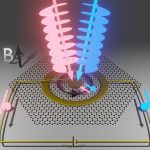Do the fastest spinning pulsars contain quark matter
Neutron stars are so named because in the simplest of models they are made of neutrons.
They form when the core of a large star...
Scientists unlock the secrets of superconductivity in iron-based materials
Scientists from the University of California, Irvine (UCI) have made a breakthrough in understanding how superconductivity works in an iron-based material.
Their findings, published in...
Could tiny black holes be hiding in planets or even everyday objects?
When you think of black holes, you probably imagine massive stars collapsing under their own gravity.
But scientists have long theorized the existence of primordial...
Could primordial black holes be hiding in plain sight
Are Primordial Black Holes real?
They could’ve formed in the unusual physics that dominated the Universe shortly after the Big Bang.
The idea dates back to...
New laser technique perfects diamond surfaces atom by atom
Imagine being able to adjust the surface of a material with atomic-scale precision using just a laser.
What sounds like science fiction has now become...
How ‘spooky action’ reveals quantum entanglement at tiny distances
Scientists at the U.S. Department of Energy’s Brookhaven National Laboratory have made a groundbreaking discovery about the inner workings of protons—the tiny particles that...
Scientists unveil the shape of a single photon for the first time
For the first time, scientists have revealed the precise shape of a single photon, the smallest particle of light.
This groundbreaking research, conducted at the...
Light meets its match: scientists discover lasers can cast shadows
Can light cast a shadow?
It sounds like a tricky riddle, but researchers have shown that, under special conditions, a laser beam can block another...
How twisted light is changing the way we control electrons
Light isn't just for seeing—it can also give things a push. When light travels, it carries energy and momentum, which is like motion energy.
Scientists...
Scientists explore nature-inspired sunscreens for safer UV protection
A team of researchers from the University of Amsterdam and the University of Warwick is taking a nature-inspired approach to improve sunscreen safety and...










